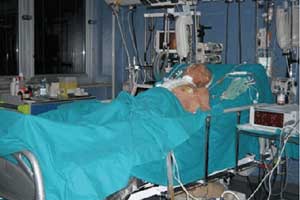- Home
- Editorial
- News
- Practice Guidelines
- Anesthesiology Guidelines
- Cancer Guidelines
- Cardiac Sciences Guidelines
- Critical Care Guidelines
- Dentistry Guidelines
- Dermatology Guidelines
- Diabetes and Endo Guidelines
- Diagnostics Guidelines
- ENT Guidelines
- Featured Practice Guidelines
- Gastroenterology Guidelines
- Geriatrics Guidelines
- Medicine Guidelines
- Nephrology Guidelines
- Neurosciences Guidelines
- Obs and Gynae Guidelines
- Ophthalmology Guidelines
- Orthopaedics Guidelines
- Paediatrics Guidelines
- Psychiatry Guidelines
- Pulmonology Guidelines
- Radiology Guidelines
- Surgery Guidelines
- Urology Guidelines
Can ICU stay per se lead to risk of depression?

United Kingdom: Stay in an intensive care unit (ICU) can lead to anxiety, depression or post-traumatic stress disorder (PTSD), finds a new study.
The study, published in the journal Critical Care, finds that patients in the UK who have survived critical illness frequently report symptoms of anxiety, PTSD and/or depression. Those who reported depression following critical illness were at higher risk of death in the first 2 years following discharge from ICU.
Robert Hatch, NIHR Academic Clinical Fellow in Intensive Care Medicine, Oxford Deanery, Oxford, UK, and colleagues assessed the anxiety, depression and PTSD caseness in the first year following discharge from an ICU.
For the purpose, the researchers asked a total of 4,943 patients who received treatment in one of 26 ICUs in the UK between 2006 and 2013, to complete a questionnaire on their symptoms of anxiety, depression and PTSD three months after discharge from ICU and again 12 months after discharge.
Read Also: Cold water swimming as a treatment for depression
Key Findings:
- 46% of patients reported symptoms of anxiety, 40% reported symptoms of depression and 22% reported symptoms of PTSD, while 18% of patients in the study reported symptoms of all three psychological conditions.
- Patients who reported symptoms of depression were 47% more likely to die from any cause (all-cause mortality) during the first two years after discharge from the intensive care unit than those who did not report these symptoms.
Also Read: Prophylactic pantoprazole in ICU offers no mortality benefit
"Psychological problems after being treated for a critical illness in the intensive care unit are very common and often complex when they occur. When symptoms of one psychological disorder are present, there is a 65% chance they will co-occur with symptoms of another psychological disorder," said Dr Peter Watkinson, the corresponding author.
"Our findings suggest that depression following care of a critical illness in the intensive care unit may be a marker of declining health and clinicians should consider this when following up with former ICU patients."
The authors caution that the generalizability of the results outside of the UK may be limited as the data was only collected from UK based patients. Furthermore, the observational nature of the study and its reliance of self-reported data mean that it does not allow for conclusions about cause and effect between ICU care and symptoms of psychological disorders.

Disclaimer: This site is primarily intended for healthcare professionals. Any content/information on this website does not replace the advice of medical and/or health professionals and should not be construed as medical/diagnostic advice/endorsement or prescription. Use of this site is subject to our terms of use, privacy policy, advertisement policy. © 2020 Minerva Medical Treatment Pvt Ltd